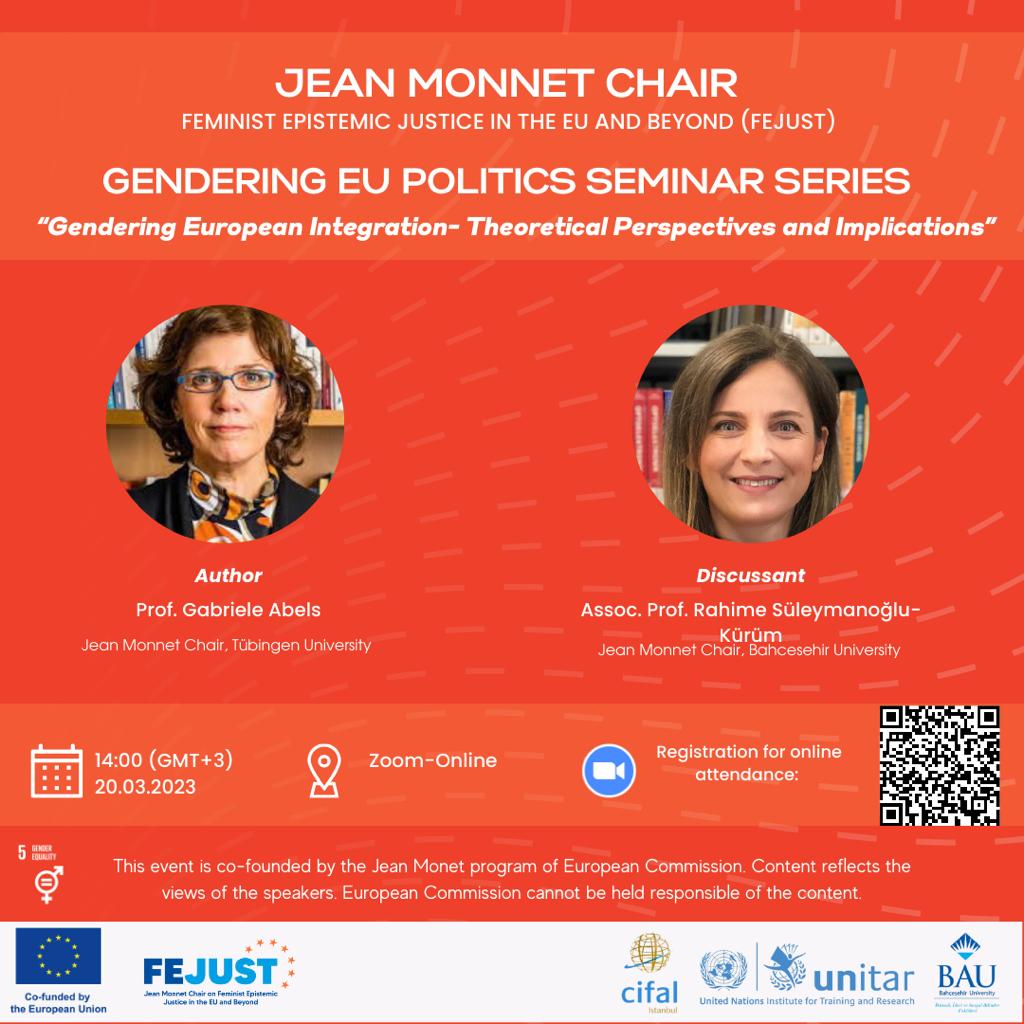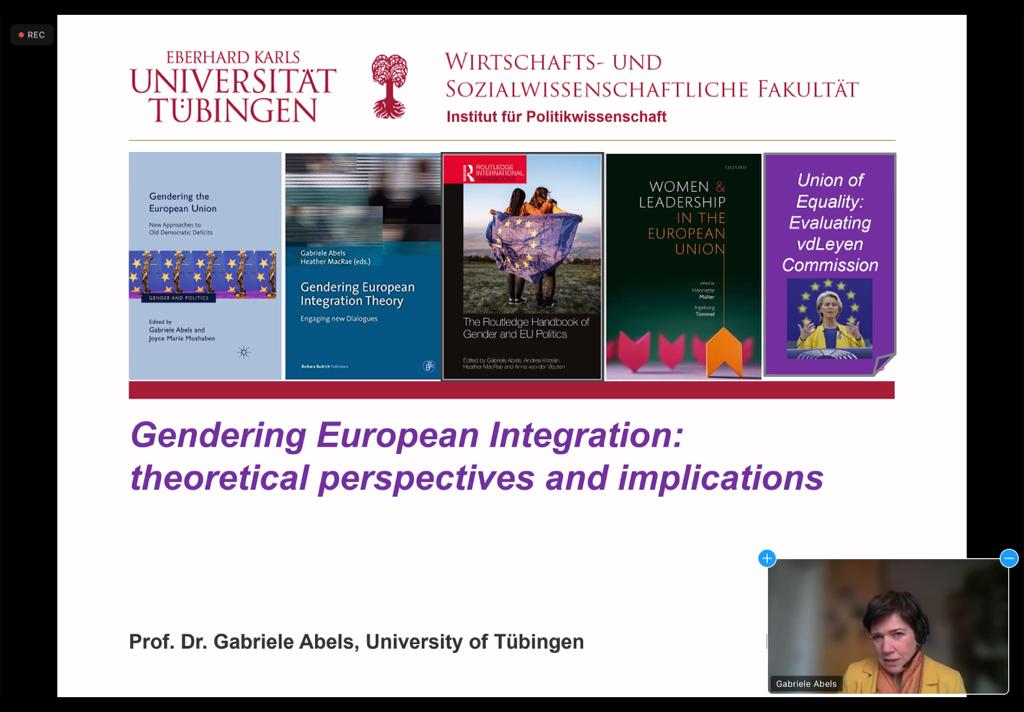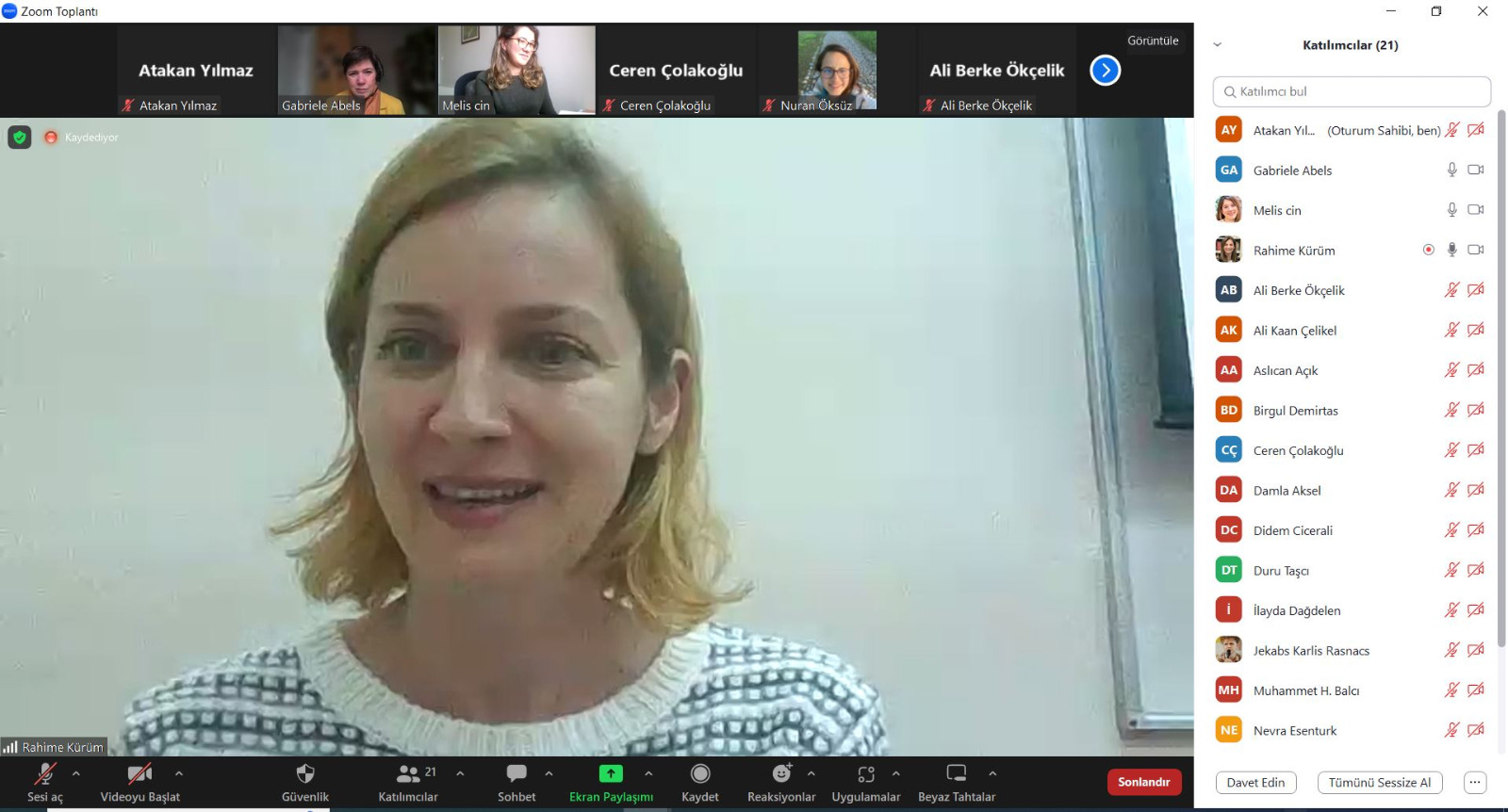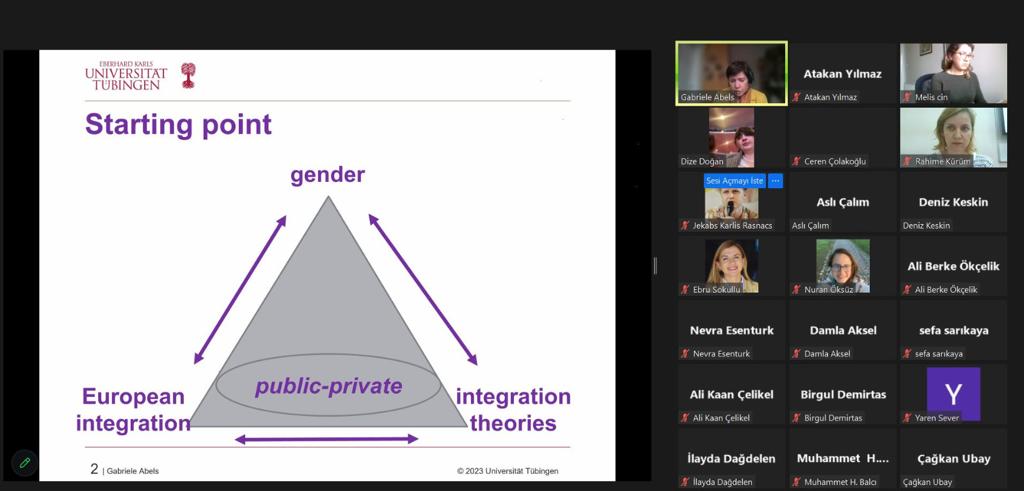SummaryGendering EU Politics Seminar 2
Title: Gendering European Integration: Theoretical Perspectives and Practical Challenges
Date: 20 March 2023
Speaker: Prof. Gabriele Abels (University of Tübingen)
Moderator: Rahime Süleymanoğlu-Kürüm, Jean Monnet Chair, BAU
The 2nd seminar in the Gendering EU Politics series featured an engaging presentation by Prof. Gabriele Abels, a leading scholar in EU studies and gender politics from the University of Tübingen. With decades of experience, Prof. Abels has significantly contributed to the fields of European integration theories and gender studies. The seminar provided a comprehensive exploration of how gender perspectives have evolved within the context of European integration and the theoretical frameworks that can enrich this field.
About the Speaker:
Gabriele Abels is professor of comparative politics and European integration at the Institute of Political Science Eberhard Karls University, Tuebingen She holds a Jean Monnet Chair since 2011 and was Director of the Jean Monnet Centre of Excellence PRRIDE 2015 2018 from 2012 to 2015 she was president of the German political science association (DVPW). She was visiting fellow at the University of Osnabrück, European University Institute in Florence, University of Missouri-Saint Louis and Harvard University. Since 2021 she is member of the Constitutional Court of Baden Württemberg. Her research interests include political systems of the European Union and EU Member States, theories of European integration, gender studies and federalism. She has recently co-edited The Routledge Handbook of Gender and EU Politics 2021.
Presentation Overview
Prof. Gabriele Abels delivered an in-depth exploration of the intersections between gender and European integration, drawing on her extensive academic research and practical insights. She began by charting the historical development of gender studies within the context of EU integration, noting how this field was initially overlooked during the first four decades of European integration. However, the Maastricht Treaty of 1992 marked a turning point, introducing social policy into the EU's framework and fostering discussions on gender equality, particularly in the labor market. This shift laid the groundwork for academic inquiry into the role of gender in EU policymaking and integration.
Prof. Abels emphasized the transformative potential of applying gender lenses to traditional integration theories such as intergovernmentalism, neo-functionalism, and social constructivism. She highlighted how these theories often neglect gendered power relations, women’s agency, and the contributions of feminist movements. For example, while intergovernmentalism prioritizes national interests and state actors, it often overlooks the role of gendered actors, such as women’s movements, in shaping policy priorities and negotiations. Neo-functionalism similarly focuses on economic elites, sidelining gender dynamics and social movements that influence integration.
The discussion also delved into the concept of the public-private divide, a critical dimension of feminist theory. Prof. Abels argued that this divide is reflected in the traditional distinction between international and domestic politics. She illustrated how gender perspectives reveal the interconnection between these spheres, showing how EU policies, such as those on labor rights and gender equality, impact women’s roles in the domestic sphere and vice versa. Additionally, she emphasized the importance of agency in integration theories, particularly the influence of women leaders, feminist movements, and gender actors in shaping EU policies and promoting gender equality.
Expanding her analysis beyond social policy, Prof. Abels explored gender dynamics across a range of EU policy areas. She highlighted how seemingly neutral policies, such as trade agreements and airline regulations, have profound gendered implications. For instance, the deregulation of air travel in the 1990s inadvertently facilitated sex trafficking, revealing the hidden gendered impacts of economic policies. Similarly, EU migration policies, particularly those addressing trafficking and asylum, often fail to incorporate intersectional perspectives, thereby overlooking the unique vulnerabilities of women migrants.
Prof. Abels also reflected on the recent initiatives under the Von der Leyen Commission, particularly the Union of Equality project, which aims to embed gender equality across EU policymaking. While applauding these efforts, she critiqued the challenges posed by rising anti-gender movements and democratic backsliding in member states like Hungary and Poland. These developments, she noted, complicate the EU’s ability to advance progressive gender policies and uphold its identity as a global leader in gender equality.
In addressing the theoretical underpinnings of gender in EU studies, Prof. Abels pointed to feminist institutionalism and feminist critiques of leadership as valuable frameworks. She argued that these approaches offer tools to analyze the gendered nature of EU institutions, including the European Parliament and the European Commission, and the role of women leaders like Ursula von der Leyen in promoting equality initiatives. By examining leadership styles and the dynamics of follower-leader relationships, she demonstrated how gender perspectives can deepen our understanding of power relations within EU governance.
Prof. Abels concluded by advocating for a broader integration of intersectionality into European integration theories. She highlighted the need to move beyond gender as a standalone category to consider how intersecting identities—such as race, class, and age—shape experiences within the EU framework. While some progress has been made in areas like postcolonial studies and migration policy, she argued that these insights need to be systematically incorporated into mainstream integration theories.
Through her presentation, Prof. Abels not only offered a comprehensive overview of the state of gender studies in EU integration but also provided a roadmap for future research. She called for continued theoretical innovation and interdisciplinary collaboration to ensure that feminist and intersectional perspectives remain central to the study of European integration
This seminar underscored the importance of feminist epistemic justice in EU studies. By challenging the androcentric bias of traditional integration theories, Prof. Abels’ work advocates for a more inclusive and equitable approach to knowledge production and policymaking. Her emphasis on the relational and structural dimensions of gender dynamics within the EU aligns with the seminar series' mission to decolonize and democratize European studies.
The event attracted an audience of academics, early-career researchers, and students from various universities and institutions. It was organised in hybrid format, attracted 23 online and 28 in person participants. In person participants were mainly FEJUST students from Bahçeşehir University enrolled to the FEJUST courses. A dynamic Q&A session followed the presentation, with discussions focusing on topics such as the role of feminist foreign policy, the gendered implications of EU responses to crises like the war in Ukraine and the COVID-19 pandemic, and the increasing challenges posed by anti-gender movements and democratic backsliding in EU member states.
Participants also engaged in critical reflections on the practical challenges faced by feminist scholars in the field, including marginalization and the need for strategic alliances to advance gender perspectives in EU studies. Prof. Abels encouraged collaboration and the building of supportive networks as a way to overcome these challenges and foster meaningful change.
Prof. Abels’ seminar provided an in-depth analysis of how gender perspectives can enrich the theoretical and practical understanding of European integration. By highlighting the need for transformative approaches that address structural inequalities and prioritize feminist epistemic justice, the event offered valuable insights for both scholars and practitioners. As part of the Gendering EU Politics series, this seminar contributed to advancing critical discussions on gender, politics, and European integration.



